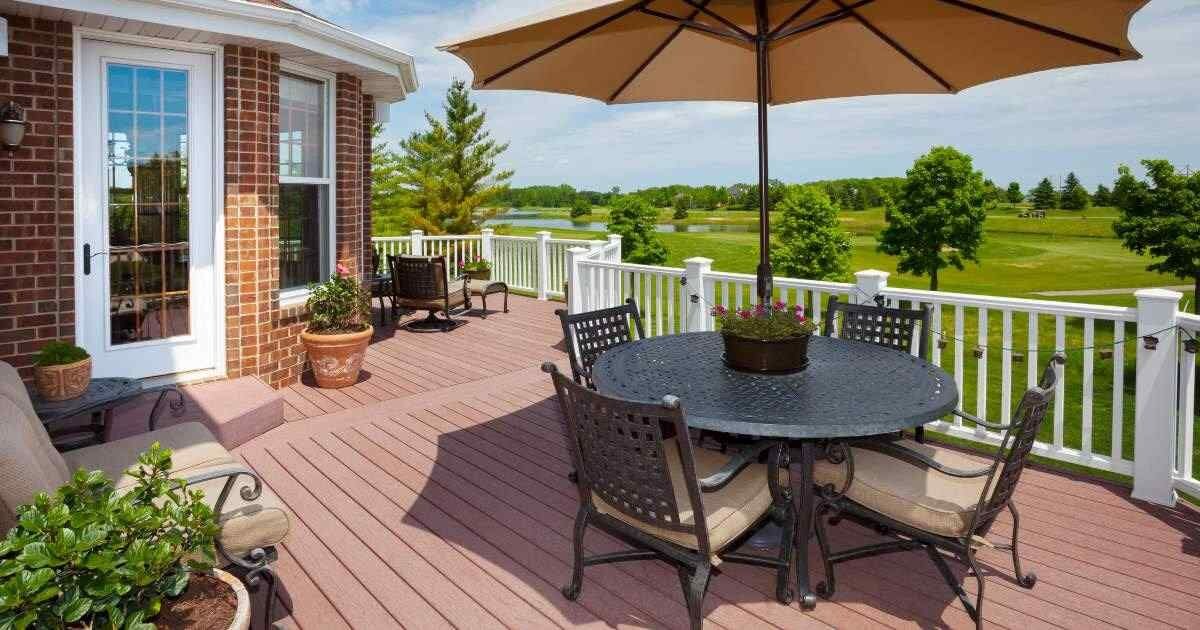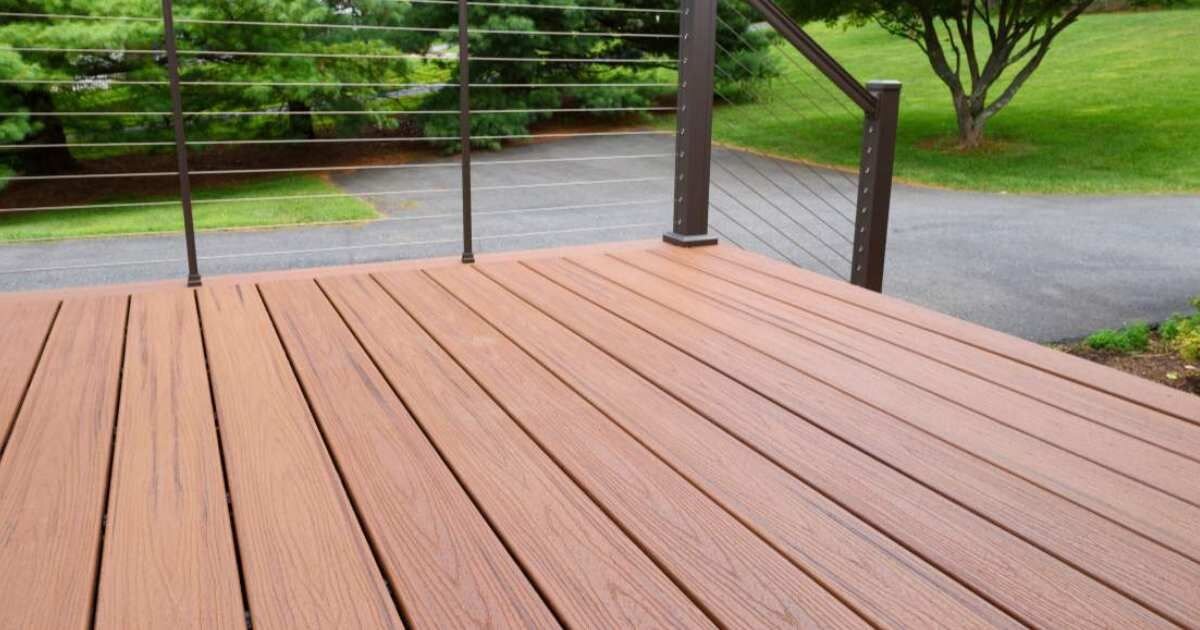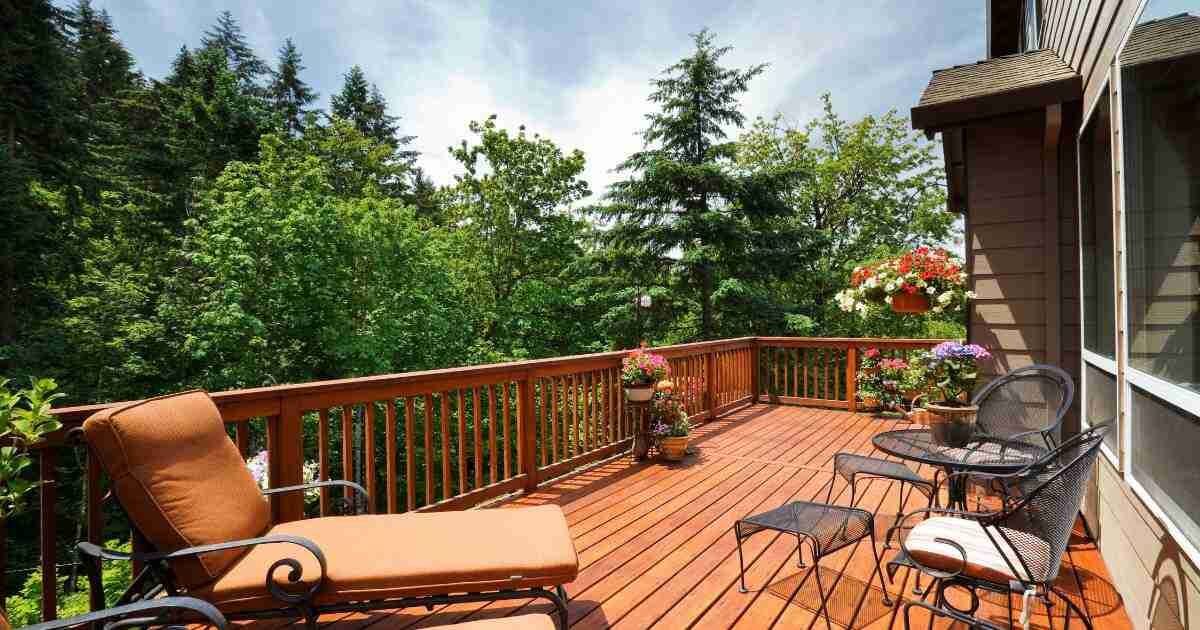Resolut Blog
Composite vs. Wood Decking: The Pros and Cons for Your Backyard

Choosing the right deck material is a big part of completing your yard's look. But with so many options, it can be tough to decide: natural wood or composite? While this question is on many homeowner's minds, it may be quite difficult to decide without knowing all the facts.
While wood decks have a classic charm, composite decks offer a low-maintenance alternative. Here, we will discuss the pros and cons of each material to help you choose which type of deck is best for your outdoor living space.
With Resolut Construction’s expertise in building both composite and wood decks, we’re here to make your decking journey easier, ensuring your final choice reflects your lifestyle and personal preferences. If you’re planning to install a new deck in the near future or would like your existing one looked at, don’t hesitate to reach out. We will gladly come to assist with your project!
What is Composite Decking?
Composite decking offers an innovative, eco-conscious alternative to traditional outdoor flooring, utilizing recycled materials (plastics and wood fibres) for a greener footprint. Combining style and substance, composite decks deliver outstanding performance and eye-catching aesthetics, making them a strong contender against traditional wood decking.
Key Features of Composite Decks
Low Maintenance: Composite decks require little to no maintenance. They eliminate the hassle of yearly sanding, staining, or sealing, reducing the costs and time it takes to maintain your deck.
Moisture Resistant: Unlike wood, composite decks do not absorb moisture, which prevents common decking issues such as rot, warping, and termite infestations. This ensures a longer lifespan, saving you time on upkeep and replacement costs.
Durability: Constructed to last through weather conditions and everyday use, composite decks maintain their appearance without losing integrity over time.

Visual Appeal of Composite Decks
Colour Variety: Composite decks offer a broad range of colours that can match your backyard oasis. From bold wood shades to contemporary hues, there is a diverse set of shades for any preference.
Texture Options: While composite decking offers textures that beautifully mimic natural wood, it also opens doors to creative expression with a variety of alternative patterns and finishes.
Design Flexibility: With its adaptable nature, composite decking complements any outdoor style, whether you're improving an existing space or starting from scratch.
Pros of Composite Decking
Homeowners who prioritize durability, sustainability, and overall cost efficiency may want to consider composite decking. Here’s why it's a good option:
Durability and Maintenance: As mentioned above, composite decks are built to last and do not face common wooden deck issues such as potential mold or fading over time. It can withstand severe weather conditions without needing repairs and will maintain its original look for years to come, keeping a brand-new appearance. Occasional cleaning, like wiping your deck, is all that is technically required.
Cost-Efficiency Over Time: Although it is a larger expense than wood decks upfront, over time composite decking becomes less expensive due to minimal upkeep and minimal repair costs. Composite decks are a long-term investment that makes your initial purchase well worth it, especially for budget-conscious homeowners.
Eco-Friendliness: Many people take sustainability into account when purchasing materials for their homes. Made from recycled plastic and wood fibres, composite decks support environmentally conscious efforts by reusing materials instead of cutting down trees.
Cons of Composite Decking
While there are many benefits to composite decking, it is important to consider the potential drawbacks before choosing to install this option.
Initial Costs: In comparison to traditional wood, composite decks have a higher upfront cost. The good news is that maintenance and repair costs are minimal to none, making it a one-time purchase.
Aesthetic Limitations: While composite decking offers a wide range of colours and textures designed to mimic the look of wood, some may feel the look falls short of true wood due to a more artificial appearance.
What is Wood Decking?
A classic choice for outdoor living, wood decks bring a timeless natural aesthetic to any backyard. Their natural beauty and the variety offered by different wood species create unique outdoor spaces.
Types of Wood Decking
Hardwoods: "Popular choices for hardwood decking include Ipe (pronounced EE-pay, also known as Brazilian walnut), Cumaru, Garapa, and Tigerwood. These exotic hardwoods, often sourced from South America, are known for their rich hues and exceptional durability. With good maintenance, hardwood decks have been known to last for decades.
Softwoods: Cedar, Pine, and Redwood are common softwoods used in decking. Generally softer and more pliable than hardwoods, they are easier to work with and offer a more budget-friendly option.
Natural Appeal of Wood Decking
Visual Harmony: Wood decks complement the natural landscape. Whether surrounded by lush gardens or towering trees, a wood deck extends your living space into nature.
Unique Grain and Colour: No two wood planks are alike. Each has its own distinct grain pattern and colour variations, creating a truly personalized and irreplaceable deck. It's this individual character that sets wood decking apart.
Versatile Styling: The great part about wood decking is that it can be customized to fit your design preferences. Wood decking offers endless possibilities to make your backyard vision reality, whether you prefer a rustic retreat or a polished, stained finish.

Pros of Wood Decking
Wood decking offers a range of benefits that continue to appeal to homeowners who value traditional charm and versatility. Here are some examples of why wood decking may be a better option for you:
Cost-Effectiveness Upfront: Wood decking often appeals to budget-conscious homeowners due to its lower initial cost compared to composite materials. This also saves money in preparation for potential upkeep costs in the future.
Customization: The ability to stain wood decking opens up a world of possibilities. From vibrant tones to subtle shades, the colour choices are virtually endless, all while maintaining the look of a natural wood finish.
Feel and Authenticity: There is a certain charm to an authentic, wood deck. Its natural textures and unique patterns provide a visually enticing experience that a synthetic material may struggle to replicate. The classic, organic appeal of traditional wood decking remains a strong selling point.
Cons of Wood Decking
There are many benefits to wood decking, however, it can also come with its set of challenges that homeowners should know.
Cost Over Time: Wood decking is more affordable when you initially buy it, but the ongoing maintenance such as staining, treatments, and eventual replacement costs can end up being more expensive than expected.
Maintenance: Wood comes with its own set of demands. Maintaining the look and durability of your deck requires work and costs money. To preserve its appearance, wood decks require regular care such as annual staining and sealing. This protects your deck from damage over time. Having your deck inspected and repaired for weather-related damages and long-term use should also be noted.
Durability Concerns: All natural resources are susceptible to environmental stressors, including wood. Moisture can lead to rot or mold if the wood isn’t properly sealed. Termites can also pose a threat to the structural integrity of your deck. Weather and general usage of your deck can cause wood to age quicker compared to composite materials, requiring more repairs.
Composite Decking vs. Wood Decking
Let’s look at a head-to-head comparison of composite decking vs. wood decking:
Cost
Composite: With higher initial costs, composite decks have zero to little long-term expenses due to minimal maintenance.
Wood: Although there’s a lower cost upfront, long-term expenses such as treatment and repairs may cause you to pay the same amount or more than composite materials.
Maintenance
Composite: Since there is no need for staining or sealing, composite materials only require basic cleaning to maintain a fresh appearance.
Wood: To support longevity, wood decking needs to be stained and sealed annually, and may also need to be repaired occasionally.
Durability
Composite: This material doesn’t absorb moisture and is highly durable and resistant to mold, rotting, and insect damage.
Wood: Being susceptible to moisture, insects, and wear over time, wood decking may need more frequent repairs depending on the type of wood used.
Aesthetic
Composite: Offering a wide range of colours and textures, composite decking can replicate wood, but there may be subtle differences that make it appear less authentic.
Wood: With a natural look and feel, wood decking is a great option to maintain the natural aesthetic of your backyard to compliment gardens, bushes, and trees.
Lifestyle Considerations
For Busy Homeowners: Composite decking may be a better option for those looking for a low-maintenance deck.
For Traditionalists: Wood decking is best for those who value a natural and traditional aesthetic, and don’t mind putting in the work to maintain a long-lasting deck.
Ultimately, the choice between the low-maintenance durability of composite decking and the natural beauty of wood depends on your individual needs and priorities. Consider your lifestyle, budget, and personal preferences to determine the best fit for your outdoor space.
For expert guidance on decking solutions, contact us today at Resolut Construction to guide you to the right choice for your backyard vision.
Contributors
Latest Posts
Show All Recent Posts
Archive
-
2025
-
2024
-
December
-
November
-
October
-
August
-
July
-
June
-
May
-
April
-
March
-
February
-
January
-
-
2023
-
December
-
November
-
October
-
September
-
August
-
July
-
June
-
May
-
April
- Kitchener Waterloo Residential Fence: Buying Guide
- Incorporating Fencing into your Landscaping Design
- Choose a Chain Link Fence Installer You Can Trust
- Prepare Your Backyard for Summer: Outdoor Organization Ideas
- 7 Essential Tips For Your Kitchener Waterloo Fencing Project
- A Comprehensive Guide For Making Your Fence Pet-Friendly
-
March
-

